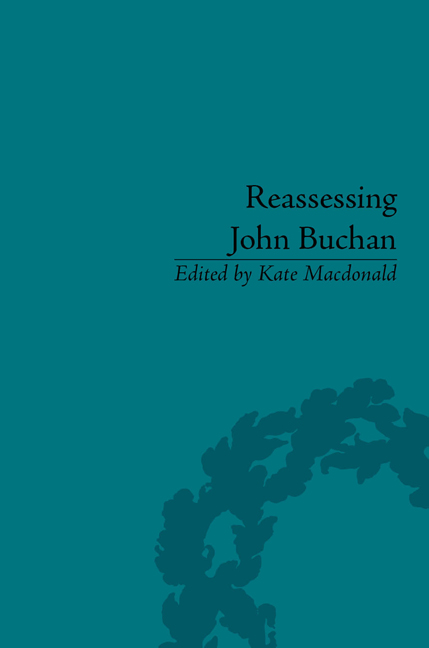Book contents
- Frontmatter
- CONTENTS
- List of contributors
- Introduction
- I Cultural Roots
- 1 John Buchan and Calvinism
- 2 Buchan and the Classics
- 3 ‘Twin Loyalties’: John Buchan's England
- 4 Buchan, Sport and Masculinity
- 5 John Buchan and the Creation of the Springbok Warrior
- II Divided Loyalties
- III Literary Art
- Notes
- Works Cited
- Index
2 - Buchan and the Classics
from I - Cultural Roots
- Frontmatter
- CONTENTS
- List of contributors
- Introduction
- I Cultural Roots
- 1 John Buchan and Calvinism
- 2 Buchan and the Classics
- 3 ‘Twin Loyalties’: John Buchan's England
- 4 Buchan, Sport and Masculinity
- 5 John Buchan and the Creation of the Springbok Warrior
- II Divided Loyalties
- III Literary Art
- Notes
- Works Cited
- Index
Summary
Buchan's family circumstances delayed his introduction to Latin till after his thirteenth birthday, and to Greek even longer. He was well taught at Hutchesons' School in Glasgow and was later grateful to his teacher James Caddell for inspiring in him a lifelong love of classical, particularly Latin, literature. At Glasgow University his professors Caird, Jones and Gilbert Murray gave him a taste for philosophy and Greek literature, Murray becoming a lifelong friend who kept him in touch with developments in classical scholarship. At Oxford, because of his late start, Buchan had great difficulty with the Mods course, but due to hard work on a heroic scale and excellent one-to-one teaching he got a very good second-class. In his Greats he got a first.
During his Greats course Buchan's writing was particularly influenced by his tutors Dr F. W. Bussell and A. H. J. Greenidge. Bussell was described by Buchan as ‘the nearest approach in my acquaintance to a mediaeval polymath’, a comment justified by Bussell's lecture list in the Oxford University Gazette of October 1898. In one term he lectured on Lucan, Outlines of Mediaeval Thought, the Epistle to the Romans, Frontiers of the Roman Empire ad 500–1500 and Fragments of Plato. Of greater importance were some lectures ‘on an obscure period of Byzantine history’ quite irrelevant to Buchan's Greats course. Bussell particularly remembered Buchan's interest in the survival of pre-Christian cults. Buchan was to make use of this knowledge in his novels The Dancing Floor (1926) and Witch Wood (1927).
A. H. J. Greenidge might have been the best ancient historian of his generation in Britain, his early death being ‘a serious blow to Roman studies’. During Buchan's period as a pupil (1897–9) Greenidge was working on his abridgement of Gibbon's Decline and Fall of the Roman Empire up to the death of Justinian. It was an important time for tutor and pupil. Greenidge's interest in Roman history was aroused by his work on Gibbon and two years later he turned to Roman history himself, planning a six-volume history from the tribunate of Tiberius Gracchus to the accession of Vespasian as emperor.
- Type
- Chapter
- Information
- Reassessing John BuchanBeyond the Thirty Nine Steps, pp. 17 - 28Publisher: Pickering & ChattoFirst published in: 2014



